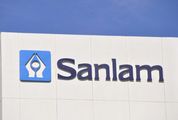Source:

BUSINESS DAY TV: Weaker rand has ‘swings and roundabouts’ effect
by Transcript Service,
2015-11-20 15:33:11.0
DARRYLL Castle is CEO of PPC.
BUSINESS DAY TV: Increased competition in the South African market has seen PPC’s cement sales volumes dwindle; despite the 2% decline in cement sales volumes though, revenue was up 2% to R9.2bn while headline earnings per share (HEPS) took a knock, falling 19%. Joining me in the News Leader studio now is the company’s CEO Darryll Castle.
Darryll, thanks so much for joining us today. So, you’re expecting demand to help you double the size of the company every decade. That’s quite an ambitious target you’ve set yourselves. Just how attainable is it in current market conditions?
DARRYLL CASTLE: It’s very attainable. When we speak about that target, we had a look at Africa over the next 35 years, really till 2050.... What we see is that the population in Africa will double to about 2-billion people over that time and then if you consider the fact that Africans will probably become wealthier over that time and ease of doing business in Africa will improve. The amount of infrastructure and building and development that Africa will require will be quite phenomenal and we have just assumed that we will maintain our current market share in Africa through the next 35 years. So our targets are based on that behind the scenes and it’s very achievable. Of course, if we talk about the tough conditions today, that’s one thing, that’s a one and two year view. Our view is a longer-term view, we think it’s a really sustainable long-term trend.
BDTV: Having said that, given the global economic outlook, you’ve got depressed commodity prices having put many of these African economies under pressure. They’re having to contend with weaker currencies as well, how much risk are you having to price into this equation?
DC: There is risk, I think there’s also opportunity and that’s the thing. If you look at Africa and you look through the cycle at the bottom of every cycle there are opportunities to acquire to expand and to get into things cheaply and as you move towards the top of the cycle there’s opportunities to make good profits as capacity becomes constrained. And if you start looking at your business on a long-term basis, you’ve got to take advantage of those different points in the cycles. So certainly at the lower end, as we are now, the risk increases because you always get nervous about will it ever change? But, of course it does change, you know we do believe in the future of Africa and people who invest in PPC should do so if they believe in the future of Africa.
BDTV: Shifting to suit the current climate is evident with your acquisitions of Safika Cement and then Pronto Readymix as well and you’ve highlighted that their support comes through to the overall performance that you’ve recorded over the period, but you’ve already taken an impairment charge on Pronto, and that’s part of roughly R80m worth of impairments you’ve charged. Why are you having to take an impairment on such a newly acquired asset?
DC: When you acquire a company like that, you attribute value to various parts of it that you acquire, but really it becomes, from an operating sense, a division of your company, and then the value in the company as a standalone entity really relies to some extent on transfer pricing between the cement business and the Readymix business. So to the extent that prices aren’t cut into the Readymix business and they’re maintained at high levels, the margins in that business will be squeezed. But, of course, the overall profitability to PPC remains the same, whether the profits sit in Pronto or in the South African business, the cement business.... But when you do that, of course, from an accounting perspective, you then need to write down the value of what you acquired. Having looked back on that acquisition, it certainly is a very good acquisition and it’s added a tremendous amount to the value of PPC.
BDTV: Okay, so a lot hinging in terms of your prospects moving forward and you holding on to your market share. Competition is stiff though and, I mean, we see this in the South African market as well as you battle a competition and then falling prices as well. So comparatively, how much competition are you facing on the African continent?
DC: Certainly in Africa the competition is less than in SA at the moment. SA currently is a very well contested market. In Africa the competition is less, but of course there is one big competitor in particular, and of course, there are others that are coming in. The rate of competition has probably slowed in terms of new entrants in Africa in general, as the global economy starts to slow to some extent. But having said that, there probably is an excess capacity in Africa, which means the existing players are becoming more competitive around trying to get their product to market. So, at any point in the cycle, what you have to understand is that you’re going to face competition, and as a company, we’ve got to not fear that competition and we’ve got to face it head on and compete with it by making sure that we’re one of the most efficient lowest cost producers.
BDTV: In the South African market, how much of your competitive advantage is being whittled away or could be whittled away with your BEE (black economic empowerment) structures moving forward. You’ve outlined a road map on that. It’s proven to be a bit tricky and unsustainable in the past with your BEE deals that were struck in 2008. What is the plan moving forward and do you see it affecting the kind of work you get in SA?
DC: No, I don’t think it does at all, we’ve got a commitment to do what we have to do and also within the spirit of what we should be doing from a BEE perspective, but that’s at a shareholding level. That doesn’t affect what we do as a company. As a company, we’ve got the new DTI (Department of Trade and Industry) codes to contend with, and even those, while onerous in the short term, force us to take into account a much broader spectrum of the population of SA and the economy, which surely over time has got to put us in a much more competitive position if we can get it right. So we don’t look at these things necessarily as negatives, they create complexity at certain points, but that’s complexity that we deal with and turn to our advantage.
BDTV: At home, you cite low-priced imports as a challenge. Still, even with the weaker rand?
DC: Yes, counteracting the weaker rand, of course, shipping rates have almost halved. So there’re swings and roundabouts with all of these things and there’s an overset pile of cement globally and a lot of people from around the world are trying to dump their cement at marginal costing in places which allow it and unfortunately SA is one place that allows this to happen.
DARRYLL Castle is CEO of PPC.
BUSINESS DAY TV: Increased competition in the South African market has seen PPC’s cement sales volumes dwindle; despite the 2% decline in cement sales volumes though, revenue was up 2% to R9.2bn while headline earnings per share (HEPS) took a knock, falling 19%. Joining me in the News Leader studio now is the company’s CEO Darryll Castle.
Darryll, thanks so much for joining us today. So, you’re expecting demand to help you double the size of the company every decade. That’s quite an ambitious target you’ve set yourselves. Just how attainable is it in current market conditions?
DARRYLL CASTLE: It’s very attainable. When we speak about that target, we had a look at Africa over the next 35 years, really till 2050.... What we see is that the population in Africa will double to about 2-billion people over that time and then if you consider the fact that Africans will probably become wealthier over that time and ease of doing business in Africa will improve. The amount of infrastructure and building and development that Africa will require will be quite phenomenal and we have just assumed that we will maintain our current market share in Africa through the next 35 years. So our targets are based on that behind the scenes and it’s very achievable. Of course, if we talk about the tough conditions today, that’s one thing, that’s a one and two year view. Our view is a longer-term view, we think it’s a really sustainable long-term trend.
BDTV: Having said that, given the global economic outlook, you’ve got depressed commodity prices having put many of these African economies under pressure. They’re having to contend with weaker currencies as well, how much risk are you having to price into this equation?
DC: There is risk, I think there’s also opportunity and that’s the thing. If you look at Africa and you look through the cycle at the bottom of every cycle there are opportunities to acquire to expand and to get into things cheaply and as you move towards the top of the cycle there’s opportunities to make good profits as capacity becomes constrained. And if you start looking at your business on a long-term basis, you’ve got to take advantage of those different points in the cycles. So certainly at the lower end, as we are now, the risk increases because you always get nervous about will it ever change? But, of course it does change, you know we do believe in the future of Africa and people who invest in PPC should do so if they believe in the future of Africa.
BDTV: Shifting to suit the current climate is evident with your acquisitions of Safika Cement and then Pronto Readymix as well and you’ve highlighted that their support comes through to the overall performance that you’ve recorded over the period, but you’ve already taken an impairment charge on Pronto, and that’s part of roughly R80m worth of impairments you’ve charged. Why are you having to take an impairment on such a newly acquired asset?
DC: When you acquire a company like that, you attribute value to various parts of it that you acquire, but really it becomes, from an operating sense, a division of your company, and then the value in the company as a standalone entity really relies to some extent on transfer pricing between the cement business and the Readymix business. So to the extent that prices aren’t cut into the Readymix business and they’re maintained at high levels, the margins in that business will be squeezed. But, of course, the overall profitability to PPC remains the same, whether the profits sit in Pronto or in the South African business, the cement business.... But when you do that, of course, from an accounting perspective, you then need to write down the value of what you acquired. Having looked back on that acquisition, it certainly is a very good acquisition and it’s added a tremendous amount to the value of PPC.
BDTV: Okay, so a lot hinging in terms of your prospects moving forward and you holding on to your market share. Competition is stiff though and, I mean, we see this in the South African market as well as you battle a competition and then falling prices as well. So comparatively, how much competition are you facing on the African continent?
DC: Certainly in Africa the competition is less than in SA at the moment. SA currently is a very well contested market. In Africa the competition is less, but of course there is one big competitor in particular, and of course, there are others that are coming in. The rate of competition has probably slowed in terms of new entrants in Africa in general, as the global economy starts to slow to some extent. But having said that, there probably is an excess capacity in Africa, which means the existing players are becoming more competitive around trying to get their product to market. So, at any point in the cycle, what you have to understand is that you’re going to face competition, and as a company, we’ve got to not fear that competition and we’ve got to face it head on and compete with it by making sure that we’re one of the most efficient lowest cost producers.
BDTV: In the South African market, how much of your competitive advantage is being whittled away or could be whittled away with your BEE (black economic empowerment) structures moving forward. You’ve outlined a road map on that. It’s proven to be a bit tricky and unsustainable in the past with your BEE deals that were struck in 2008. What is the plan moving forward and do you see it affecting the kind of work you get in SA?
DC: No, I don’t think it does at all, we’ve got a commitment to do what we have to do and also within the spirit of what we should be doing from a BEE perspective, but that’s at a shareholding level. That doesn’t affect what we do as a company. As a company, we’ve got the new DTI (Department of Trade and Industry) codes to contend with, and even those, while onerous in the short term, force us to take into account a much broader spectrum of the population of SA and the economy, which surely over time has got to put us in a much more competitive position if we can get it right. So we don’t look at these things necessarily as negatives, they create complexity at certain points, but that’s complexity that we deal with and turn to our advantage.
BDTV: At home, you cite low-priced imports as a challenge. Still, even with the weaker rand?
DC: Yes, counteracting the weaker rand, of course, shipping rates have almost halved. So there’re swings and roundabouts with all of these things and there’s an overset pile of cement globally and a lot of people from around the world are trying to dump their cement at marginal costing in places which allow it and unfortunately SA is one place that allows this to happen.






















Login OR Join up TO COMMENT